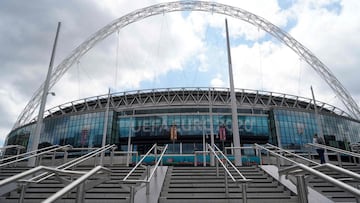Scotland to go against racism 'stance' for England support at Wembley
Steven Clarke has said that his boys will join England's players by going down on one knee before the Euro 2020 clash on 18 June.

Rivals on the pitch in the group stage of Euro 2020 but united by the same idea. Scotland will join England in taking the knee when the great rivals meet, with head coach Steve Clarke vowing to fight racism and tackle "ignorance".
Scotland show support to English over abuse
England's players have been going down on one knee before games as a protest against racism, while Scotland have since March stood together as a group to make their own united statement. They intend to carry on in that way but will make an exception for the England game at Wembley on 18 June, having been disappointed by reactions to their own method of facing down discrimination.
A frustrated Clarke said that "some individuals and groups have sought to politicise or misrepresent the Scotland national team position". He reiterated his squad's view that "the purpose of taking the knee ... has been diluted and undermined by the continuation of abuse towards players", but Clarke does not want Scotland's actions to be interpreted as anything but being vigorously opposed to discrimination.
The one-off policy shift is a statement of Scotland's solidarity with their English counterparts, who have faced booing from supporters of the national team after taking the knee.
Euro 2020 news:
- Thiago and Spain 'hungry' for Euro start after fraught preparations
- Bale: "We know we’ve got a difficult group"
- Euro 2020: when and where will the final be played?
- Who won the last Euros and which country has the most titles?
- Ronaldo primed to take Platini's European record
"In light of divisive and inaccurate comments being perpetuated by individuals and groups, whose views we denounce in the strongest terms, we have reflected today as a group," Clarke said. "We remain committed to our principles of taking a stand but we must also be unequivocal in condemning the opportunistic false narrative being presented by some.
"We have therefore agreed that we will show solidarity with our counterparts in England, many of whom are team-mates of our own players, and who have found themselves on the receiving end of abuse from fans in recent international matches. We will continue to take a stand – together, as one – for our matches at Hampden Park. For our match at Wembley, we will stand against racism and kneel against ignorance."
A message from Scotland Men's Head Coach Steve Clarke and captain Andy Robertson.https://t.co/xYisBbKH68
— Scotland National Team (@ScotlandNT) June 11, 2021
Scotland's First Minister Nicola Sturgeon backed the move, writing on Twitter: "Good decision, Scotland – well done!"
Anti-racism kneel gesture controversy at Euro 2020
England were booed by some of their fans in two friendlies while Ireland were jeered in Hungary for kneeling before kickoff in a move borrowed from American NFL quarterback Colin Kaepernick and popularised by the Black Lives Matter movement.
France, one of the tournament favourites, have taken the knee in recent games as have Belgium, Wales and Finland, so the gesture may feature prominently during Euro 2020. Moving away from its long-standing stance of opposing political protests, governing body UEFA says it is up to each team to decide and simply inform the referee in advance.
Though broadly supported by most fans in Western Europe, according to a survey, some reject the symbol as too overtly political and allied with far-left movements. Hungary's nationalist Prime Minister Viktor Orban defended fans in Budapest for reacting this week to an "unintelligible" gesture for their culture. "If you're a guest in a country then understand its culture and do not provoke it," he said.
Can #ENG deliver at #EURO2020 ?
— AS USA (@English_AS) June 11, 2021
A look at the England 26-man squad squad for Euro 2020: selected players, absenceshttps://t.co/dwLJWJwoDe
Two of England's Group D rivals - Croatia and Czech Republic - are unlikely to join them in going down on one knee. The third, Scotland, as stated above, said they would only join in the gesture during the game against England at Wembley out of solidarity.
The English players looked shocked at boos from the stands during two home friendlies, given that the knee gesture has been common at Premier League matches for over a year, following the police killing of American George Floyd in May, 2020. However, most games took place during covid-19 restrictions without fans, meaning criticism was limited to social media.
A YouGov poll published this week found that a majority of fans in nine West European countries surveyed support the gesture, ranging from 79% in Portugal to 44% in the Netherlands and 54% in England where the controversy has been sharpest and 39% are opposed.
'Supporting each other'
One British member of parliament, Lee Anderson of the ruling Conservative Party, is going as far as to avoid games. "For the first time in my life I will not be watching my beloved England team whilst they are supporting a political movement whose core principles aim to undermine our very way of life," he said.
England manager Gareth Southgate, however, has been supportive and participating in the gesture on the sidelines, saying black players need to feel solidarity after a bombardment of abuse online and at some games.
🆕 | NEW FEATURE
— SofaScore (@SofaScoreINT) June 11, 2021
We have one novelty left to present you - our very own #EURO2020 power rankings!
It's completely based on stats and numbers, and they will be updated after each round of the tournament.
Here are our pre-tournament rankings! 👇#YourSofaYourStadium pic.twitter.com/WOdRTZhFkx
"Some people seem to think it's a political stand that they don't agree with. That's not the reason the players are doing it. We're supporting each other," Southgate said, criticising the boos.
"It's not something on behalf of our black players I wanted to hear because it feels as though it's a criticism of them."
British Prime Minister Boris Johnson also asked fans on Friday not to boo.
Former England striker and TV presenter Gary Lineker, too, has chastised protesting fans. "If you boo England players for taking the knee, you're part of the reason why players are taking the knee," he tweeted.
But another Conservative lawmaker, Brendan Clarke-Smith, said fans' intelligence was being underestimated. "Fans understand perfectly well: they are just sick and tired of being preached and spoken down to. They are there to watch a football match, not to be lectured on morality," he said.
With the controversy echoing around Europe, Orban argued that the gesture was meaningless for Hungarians, given it had no legacy of slavery.
Related stories
Polish Football Association head Zbigniew Boniek, a UEFA vice-president, has also dismissed the action.
"This is clear populism because nothing is done because of it. Footballers sometimes kneel and if you'd ask some of them why they're kneeling, they wouldn't even be able to tell you why," he told reporters in April when his team stood as England kneeled before a match at Wembley.
